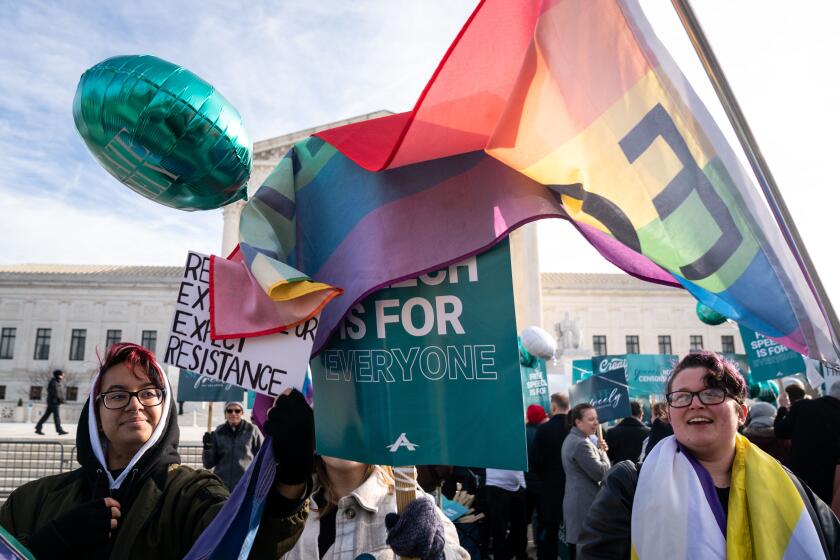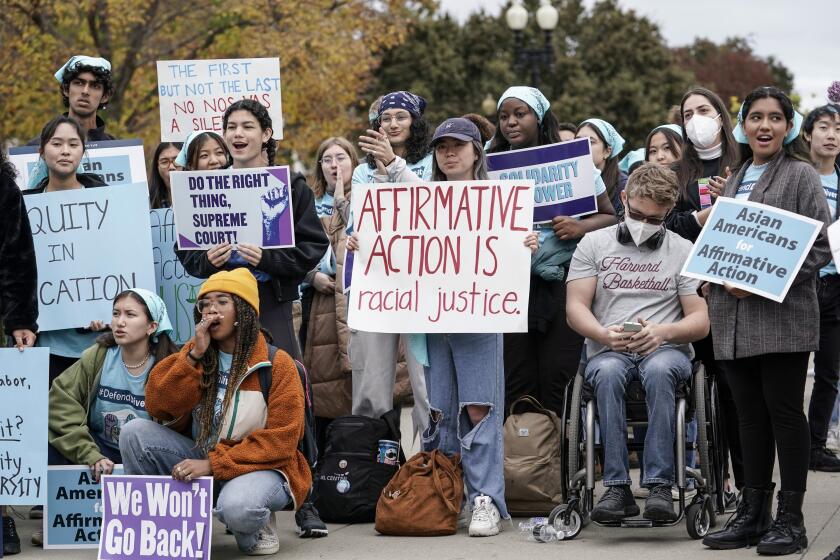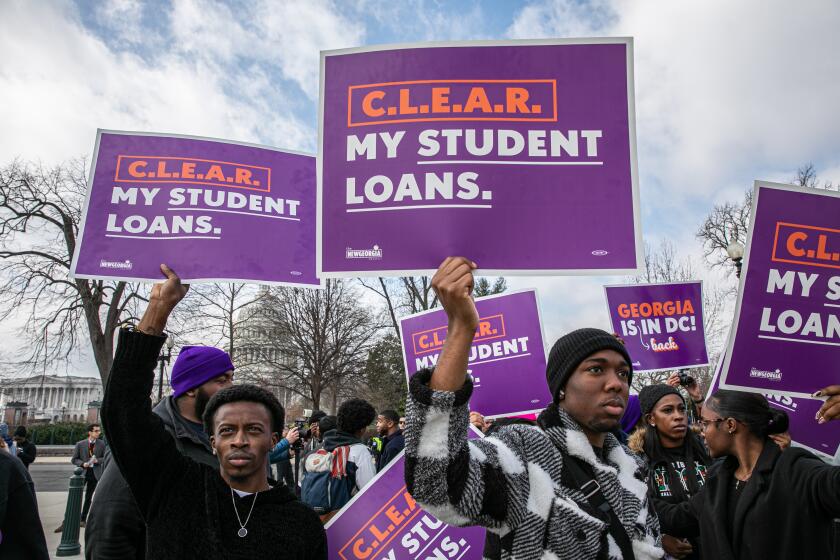Column: How the ripple effect of the Supreme Court’s 303 Creative decision could swamp civil rights

- Share via
Now that the legal door has been opened to anti-LGBTQ+ bigots or racists, there’s just no telling how far the Supreme Court’s license to discriminate will go.
Last month, the court’s conservative majority ruled that a website designer in Colorado would not violate the state’s antidiscrimination law if she refused to create wedding websites for gay couples.
Mind you, Lorie Smith, the proprietor of 303 Creative, was not actually creating wedding websites at that point, but she wanted to know in advance whether it would be OK to turn away gay people because she abhors same-sex marriage.
Smith is represented by the right-wing Christian legal juggernaut Alliance Defending Freedom, which is hellbent on reversing LGBTQ+ rights.
To Smith, her lawyers attested, same-sex marriage “is not only problematic because it violates God’s will, but also because it harms society and children because marriage between one man and one woman is a fundamental building block of society and the ideal arrangement for the rearing of children.”
In telling their client’s story, the ADF laid it on thick: “Lorie believes that our culture’s movement away from God’s design for marriage is particularly pronounced in the wake of the Supreme Court’s Obergefell v. Hodges decision, which held that there is a constitutional right to same-sex marriage.”
I thought it was bizarre to be able to bring a lawsuit with imaginary facts, but as Berkeley Law Dean Erwin Chemerinsky explained to me, federal law allows for such a thing, especially if the situation seems likely to arise eventually.
“No one should have to eat a mushroom in order to know if it’s poisonous or not,” Chemerinsky said. “She says, ‘I am not going to set up this business if I have to serve same-sex couples, so let me know in advance.’ ” Fair enough.
For the first time in U.S. history, the Supreme Court granted a business open to the public the constitutional right to discriminate against would-be customers
As for reports that Smith made up the gay couple she claimed had contacted her for wedding website services (even though she hadn’t launched that business yet, hmmmm), Chemerinsky said it no longer matters whether they existed or not.
“Once the court decides,” he said, “you can’t challenge the case.”
It will come as no surprise that the Alliance Defending Freedom also represented the Colorado baker who won a limited Supreme Court victory in 2018 after he refused to make a wedding cake for a gay couple. Later — and I tell you this to demonstrate that fears about the repercussions of Supreme Court-sanctioned discrimination are not far-fetched — the same baker, Jack Phillips, found himself back in court after refusing to make a cake celebrating a gender transition.
What he can and can’t refuse to do remains contentious: The state appeals court found that Phillips violated Colorado’s antidiscrimination law.
How so? Because the customer, Autumn Scardina, had simply ordered a pink cake with blue frosting. That design, said the court, had no message or imagery that could be construed as violating the baker’s rights.
Of course, the ADF has appealed the ruling to the Colorado Supreme Court.
The conservative justices are making the country a more hostile place for Gen Z and millennials. But elections can still change that.
But back to the 303 Creative decision.
In this case, the Supreme Court said, essentially, “Why, yes, of course, Ms. Smith, if same-sex marriage goes against your beliefs, then by all means you may refuse service.” The court’s opinion did not turn on the fact that her beliefs arise from her religion (although they do), but that her freedom of expression — her 1st Amendment rights — would be violated if Colorado forced her to create websites for same-sex couples, or fined her for not doing so.
Making a wedding website may indeed involve the maker’s creative expression. But what else falls into that category?
“In the wedding context,” said Chemerinsky, “it could be designing a cake, floral arrangements, stationery. In other contexts, it could be a cabinet maker — all of it is open.”
There really is no stopping point.
“Doubtless, determining what qualifies as expressive activity protected by the First Amendment can sometimes raise difficult questions,” opined Justice Neil M. Gorsuch, who may not be able to define expressive activity, but will undoubtedly know it when he sees it.
The ACLU, staunch defender of the 1st Amendment, said the court got it all wrong. The case was not about free expression but about
discrimination.
Congress has tied its own hands when it comes to legislating, leaving a power vacuum the justices have filled eagerly.
“Properly framed,” ACLU attorneys wrote in a friend-of-the-court brief, “the question presented is whether an artist who has chosen to open a business to the public at large, can constitutionally be prohibited … from discriminating against customers on the basis of a protected characteristic.” In Colorado’s antidiscrimination law, those characteristics include race, color, religion, sexual orientation and gender identity, among others.
It is too soon to see exactly what ripple effects this unfortunate decision will have. But you can be sure it will be construed in many corners as a license to discriminate based purely on personal beliefs.
As Colorado Atty. Gen. Phil Weiser put it after the decision came down, “A business may think that it can refuse to serve interracial couples because it believes interracial marriage is wrong. A payroll company may … refuse service to women-owned businesses because the business owner believes women should not work outside the home. A bookseller of religious texts may believe it can refuse to sell books to a member of the Church of Jesus Christ of Latter-Day Saints because he doesn’t believe it to be a legitimate religion.”
Thanks to the Supreme Court, the possibilities for discriminating against those who have traditionally been protected by civil rights laws are endless.
Heckuva job, justices.
More to Read
A cure for the common opinion
Get thought-provoking perspectives with our weekly newsletter.
You may occasionally receive promotional content from the Los Angeles Times.















